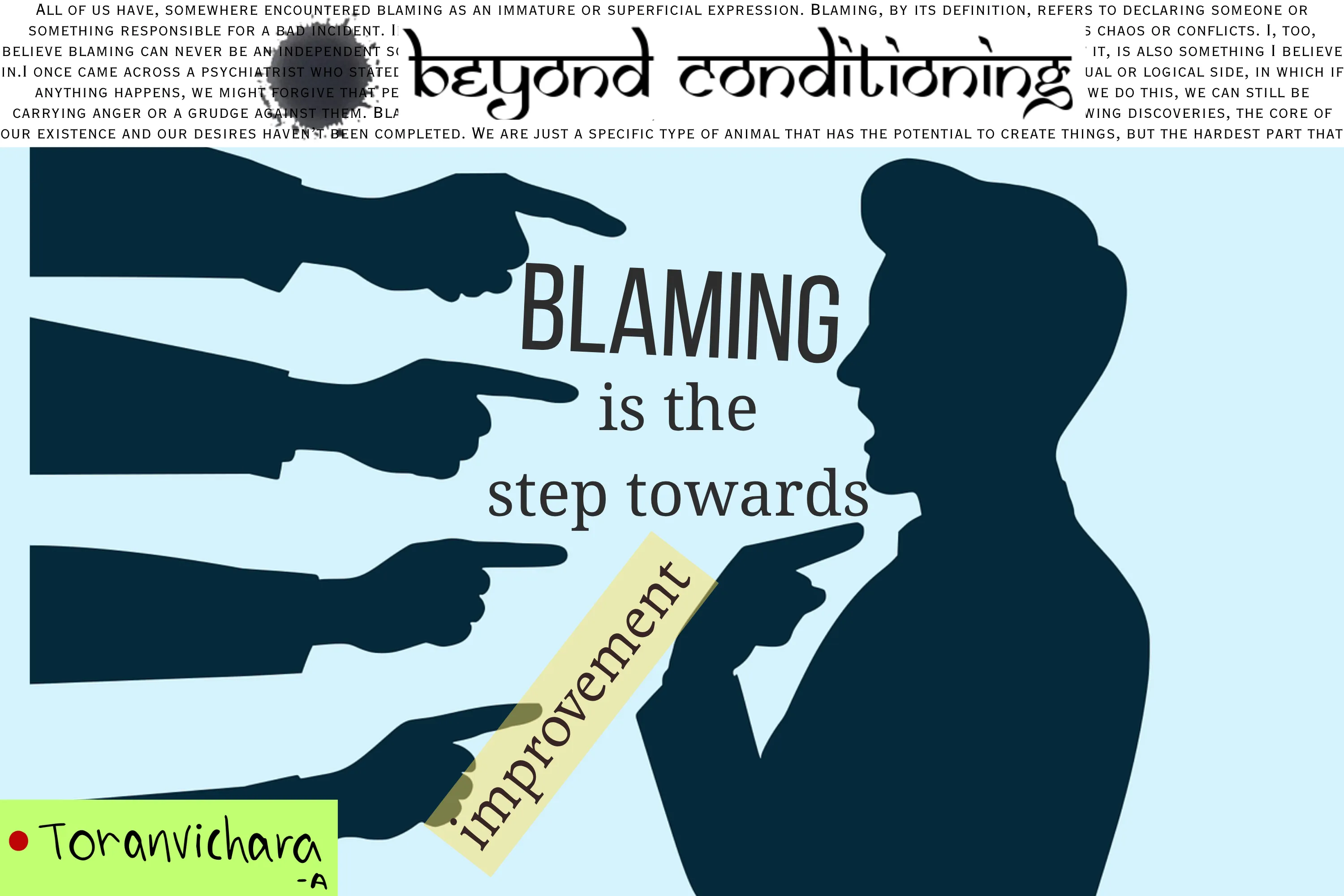
All of us have, somewhere encountered blaming as an immature or superficial expression. Blaming, by its definition, refers to declaring someone or something responsible for a bad incident. In many cases, it’s said that it doesn’t support problem-solving but rather invites chaos or conflicts. I, too, believe blaming can never be an independent solution, but a solution can never be independent without blaming being a part of it, which is also something I believe in.

I once came across a psychotherapist who stated that we, as humans, have two parts to our personality. One lies in the intellectual or logical side, in which if anything happens, we might forgive that person or situation, but we don’t realize it’s just half of the solution. Even after we do this, we can still be carrying anger or a grudge against them. Blaming isn’t a perfect response, but just as we have made impossible and mind-blowing discoveries, the core of our existence and our desires haven’t been completed. We are just a specific type of animal that has the potential to create things, but the hardest part that still remains is to have a happy and fulfilling life. The truth is, we are ANIMALS, and actual growth requires a part of blaming until we are enlightened.

I believe blaming, without a harsh emotion or anger, is equivalent to constructive criticism. And it’s really necessary. Outdoor evaluation has always been a more comfortable and fun thing to do as a human being, but self-evaluation and self-judgment are really hard or even feel like a betrayal, where blaming is necessary to see yourself as a complete person. Nowadays, lying on my bed, I can know what my favorite celebrity eats or when he/she goes to the gym, and this opinion-enhanced world created by social media leads a lot of us away from our own inner reflection. Eastern philosophy has always been about self and inner discovery, and it’s a really important thing. But how does all of this connect to blaming? It is by understanding how blaming is the necessary second step after recognizing an issue.

The way it goes is this: suppose I treated someone in a wrong way. I recognize that I was wrong, I have the courage to blame myself, and that induces a necessary emotion of sadness. Then I go to the person, express my side, admit my mistake, and then I self-improve. The point is, blaming is the step that induces emotions in us, and emotions are never good or bad. We, as humans, need to experience every emotion, and blaming is where it occurs. Also without blame acknowledgement can’t occur. Blaming is the action that provokes acknowledgement as a reaction .

Harshness or extremist blaming is, of course, no doubt wrong, just like how everything beyond an extent is harmful. But blaming in its right way, to self or others, is necessary, even if it might create potential conflict. Blaming also advocates to even establish an order, and it also lets the young learn ideas or reasons for what makes things wrong. A loving household needs a part of free blaming combined with support for everyone to grow. Blaming also requires self-love and self-acceptance. If someone (or myself) blames me, it hits more on my emotions than my intellect, where it compels me to grow self-acceptance along with self-improvement. Blaming also calls for a proper evaluation. If I am blamed, it generates a huge inner conflict that compels me to have a proper judgment to see if I actually performed anything wrong.

At the same time, blaming can also be a gray zone if an individual isn’t emotionally healthy. I have encountered people who take blame as a neutralizing factor, like how they could have turned it into an opportunity to grow but rather turned it into a self-harming weapon. Also, we have encountered people who skip the part where they could have evaluated themselves or the situations, but rather they accept whatever attributes (for example, laziness) they were blamed with.

As an ending thought, I believe being able to blame yourself and navigate toward improvements exercises self-love and acceptance. This is the healthiest way for growth, where blaming shouldn’t be stigmatized so that the fact that we are animals wearing tuxedos isn’t hidden. We need a strong emotional foundation that lets us take blame in a healthy way, rather than trying to uproot and hide our true nature. Instead of considering blaming as a rude or amateur behavior.

